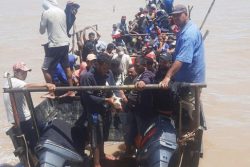Commissioning the expensive Schoonord to Crane four-lane highway on Thursday, President Ali delivered a stunner. When completed, commuters over the new high-span Demerara River Bridge will not have to pay any tolls. The same would be the case for the Wismar Bridge under construction and the crossing of the Berbice Bridge, he said.
No commuter currently paying tolls will baulk at the decision however there is a lot more at stake here than a couple of hundred dollars in the case of the Demerara crossing. First, the President’s announcement aligns perfectly with the concerns raised by Dr Bertrand Ramcharan in Tuesday’s edition of this newspaper about the autocratic tendencies of this government. There has been no discussion whatsoever of this decision whether in Parliament, Cabinet or the street. It had not even been hinted at in the party’s manifesto.
Second, President Ali and the relevant members of his Cabinet would be aware that decisions of this order are usually embedded in policy. A transport policy developed as a result of a white paper or even a green paper taken to Parliament would have delineated the parameters of possibility considering the huge amounts of oil money flowing into the economy. Is it the intention now that all public transport should be free. What about transport on ferries? Shouldn’t those users also be reprieved? And where will all of this inevitably lead? Lowered personal income tax and VAT?
The requirement for parity in treatment of commuters obligated the President to say that users of the Berbice River crossing will also not have to pay tolls. That undercuts entirely the near two decades that commuters paid hefty tolls to cross the Berbice Bridge and had to decide which trips were affordable and which were not. They will now finally be freed of the tolls which were foisted upon them as a result of the financing model for the bridge that was developed under the Jagdeo administration. Returns to key investors in the bridge such as the NIS are still to be comprehensively analysed to determine the wisdom of the decision.
Third there is good reason why bridges have traditionally been tolled. Depending on the model used to build it, the capital has to be recovered and then there are the recurrent expenditures for maintaining and running the bridge, repairing it whenever accidents occur as has been frequently seen with our own Demerara Harbour Bridge Corporation. Tolls assist greatly with the maintenance and upkeep of the bridge so that it doesn’t become an enormous burden to Central Government. The assigning of tolls also helps to regulate travel – something desperately needed here – so there aren’t wanton, unnecessary trips that burn a hole in the pockets of consumers and exacerbate carbon emissions.
Removal of the tolls means that the government will assume full responsibility for the operation of the bridges and the corporate model currently in place for the Demerara and Berbice crossings which takes account of market considerations and makes prudent decisions has been ejected. There clearly is confusion in the government. The contract for the new Demerara Bridge was issued under a Design-Finance-Build model that eventually saw a loan being contracted by the government at undisclosed rates when it should have financed the project on its own.
Fourth, the elephant in the room is the complete discombobulation of the government by its unmeritorious landing in an oil bonanza. Having devised a withdrawal rule from the Natural Resource Fund (NRF) that was profligate and unthinking, the government amended the NRF Act this year to extract even more on an annual basis. The need for inter-generational equity for a non-renewable resource has been completely discarded and the NRF board and its various committees function as mere sinecures. This government needs to come to its senses. It is completely intoxicated by the oil monies available to it and is spending it without a plan or due consideration to the risks to these revenue flows in the short to medium term.
Fifth, the decision by the President yokes future governments to maintaining these concessions particularly when it might not be sensible or affordable. Once these concessions are granted it would be a brave government that seeks to withdraw them. This is why there was good sense in political parties and civil society working to devise a common plan for the use of oil revenues and a determination of the weighting of spending on infrastructure, investment in diversifying away from oil and gas, subventions to the sugar industry etc.
Sixth, while the President exulted at his `victory’ over critics at being able to make his announcement about the toll-free travel, he remains oblivious to the plaintive cries from the public on the cost of living. In 90 instalments in this newspaper ordinary people from all parts of the country have recounted their daily struggles to put food on their table, take care of their medical needs and look after elderly members of their family. President Ali’s government appears unable to respond to their needs with a viable plan. Toll-free travel over bridges will make little difference to the bottom line for families. No transport factor in the movement of goods over the bridge will be alleviated and the savings passed on to the consumer. The cost of living will continue to batter these households.
History will judge President Ali’s announcement on Thursday as reckless and a naked overture for votes at next year’s election. It is not the way to run a country. It is not the way to manage this extraordinarily rich vein of resources that Guyana has been fortunate to tap.







